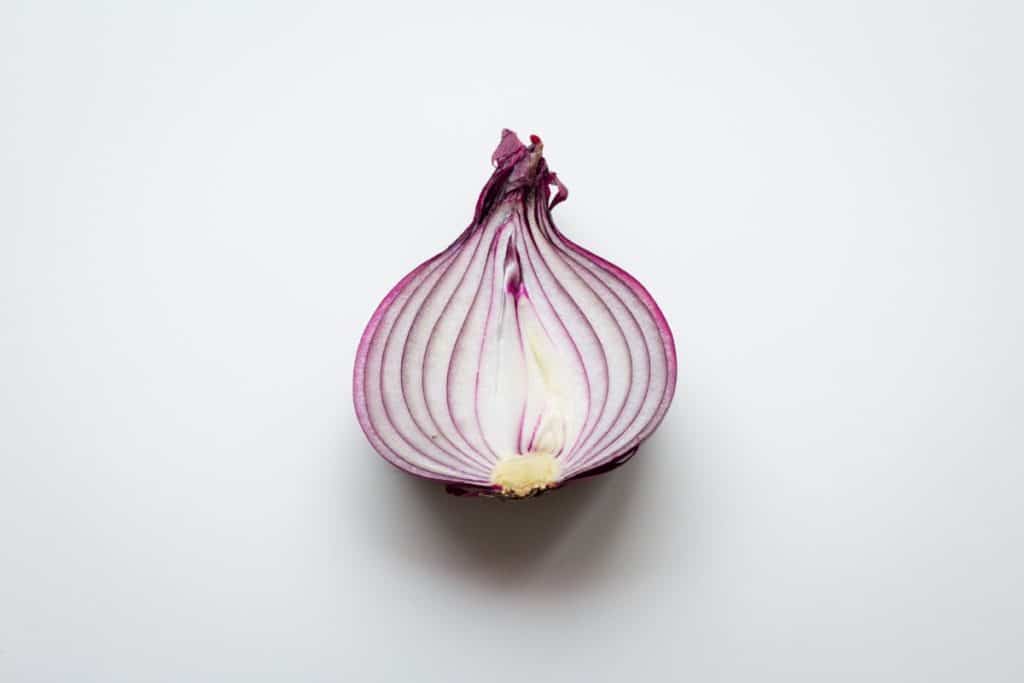
In this article we will show the secrets behind how chefs cut onions without crying.
When chopping onions in the kitchen at home, we all know that feeling when the stinging sensation starts and the tears begin streaming out of our eyes.
If you’re anything like me, it is almost a badge of honour to prove how tough you are being able to continue the meal preparation under such circumstances!
However, if you’re starting a chef career you may be concerned about how to cope when there is a whole bag to cut! Are chefs expected to just put up with the pain? or do they have a few tricks up their sleeves?
you may be concerned about how to cope when there is a whole bag to cut! Are chefs expected to just put up with the pain? or do they have a few tricks up their sleeves?
Chefs have several methods they use for not crying whilst cutting onions. These are; using a sharp knife, keeping the onions in the fridge, location in the kitchen where the cutting is carried out, and some strategic use of wet towels.
All of the methods detailed below are definitely something all home cooks can try, as well as being very useful for new chefs.
Unfortunately, if there is a pile of onions that need to be chopped, that job is being passed straight to the new Commis chef
1. Using A Sharp Knife
Using a sharp knife is perhaps the most important thing to do when attempting to cut onions without crying.
A sharp knife will allow us to complete the job faster, but more than that, it results in cleaner cuts through the onion.
will allow us to complete the job faster, but more than that, it results in cleaner cuts through the onion.
These cleaner cuts break open less cells of the onion so less chemical reactions can take place. I’ll link to the Britannica web page here for those interested in the science behind why an onion makes us cry.
for those interested in the science behind why an onion makes us cry.
Anyone who’s ever tried grating an onion will know the intense feeling of our eyes burning which is impossible to overcome.
Using a blunt knife is similar to this, albeit not quite as extreme. A blunt knife is mashing the onion more than cutting it, breaking open far more of the cells than we need to.
2. Keep Onions In The Fridge
Keeping onions in the fridge is a method chefs will use as a way of preventing themselves from crying whilst cutting them, and this is a method all home cooks can adopt.
When the onions are cold we are slowing down the enzymes (there are those pesky enzymes again causing problems!) By slowing the enzymes down we are slowing down the chemical reactions that ultimately lead to our tearful eyes.
This method is just as important for chefs as using a sharp knife. In fact combining cold onions with a sharp knife will have a dramatic affect for anyone suffering with stinging eyes.
As a chef, if we know that one of our tasks tomorrow is to prep a lot of onions, it’s a good idea to throw them in the fridge the night before (if they aren’t already kept in there). This allows them to be nice and chilled for the following day.
is to prep a lot of onions, it’s a good idea to throw them in the fridge the night before (if they aren’t already kept in there). This allows them to be nice and chilled for the following day.
If I need to prepare lots of onions pretty quickly I will often put the bag in the walk in freezer for half hour or so, just to make an attempt at chilling them down a little.
3. Placement Within The Kitchen
When a chef has lots of onions to cut they will often take their chopping board and set up their cutting station as near to the extract fan as possible.
The kitchen fans draw the air out of the kitchen, including the vaporizing chemical (syn-propanethial-S-oxide) which helps prevent it from going into our eyes.
An open window is helpful but the extract fans are the real benefit to professional chefs a they can circulate the air so quickly. Setting up a chopping board near to the cooker extract fan at home is a good alternative for home cooks.
a they can circulate the air so quickly. Setting up a chopping board near to the cooker extract fan at home is a good alternative for home cooks.
Turning the fan speed up whilst chopping is a great way to help ourselves. However, the trade off is the extra noise created by the fan, but no one really minds as long as we are working fairy quickly!
4. Use A Cold Wet Cloth
A chef will often place a cold wet cloth over a pile of onions that have been peeled but are waiting to be cut, as this is another great tip for preventing us from crying.
The wet cloth helps to keep the onions cold whilst sat on the work bench and provides some protection from the hazardous vapours being released.
When faced with a large pile of onions it is often best to peel all the onions in one go, placing each one under the wet cloth after peeling it. Then remove the onions one by one to cut them.

5. Wash The Onions
Some chefs choose to wash onions under cold running water after they have been peeled as added protection against crying whilst cutting them.
I personally never liked this method as I found a pile of wet onions quite difficult to cut and the previous four techniques combined seemed to work well without resorting to this method.
as I found a pile of wet onions quite difficult to cut and the previous four techniques combined seemed to work well without resorting to this method.
However, it is definitely an option and something many chefs swear by. The science behind this is less about washing the hazardous ‘juice’ away, and more about cooling the onions down under the cold running water
If we are really struggling we could plunge them into some iced water. My preferred method though in this instance would always be to put them in the freezer for 20 minutes.
To Sum Up
Hopefully now we have built up a picture of how chefs can cut onions without crying. By following these five steps we can guarantee tear free onion chopping almost every time.
- Set up a chopping board under the extract fan, and turn the fan speed up higher if necessary.
- Have the onions nice and cold from being kept in the fridge.
- Using a sharp knife helps us to do the task quicker and breaks the onion up as little as possible.
- Place peeled onions under a wet towel whilst they are waiting to be cut.
- If needed, wash the peeled onions under cold running water or submerge in ice water for 10 minutes before cutting.
I will note here that even professional chefs, following all these tips, struggle to prevent their eyes from stinging some times.
The types of onions do make a difference. Shallots generally don’t cause people to cry as much, so if anyone is really struggling they could try switching to these in their cooking. Plus shallots just taste great as an added bonus.
At times, there are just some batches of onions that seem super strong and everything we do doesn’t help. In these scenarios it is not just us who’s cutting them that have the watery eyes but usually every chef in the nearby vicinity.
